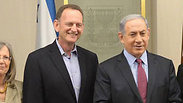
The opening shot of the battle for the defense budget
Analysis: In the battle over early retirement in the IDF, both sides are pulling no punches; the IDF says the Locker report will discriminate against female officers and scare off intelligence and cyber officers, while members of the committee return fire: 'They hid information from us’.
Locker knows the main players well. In the years he served as the prime minister's military secretary, he saw all of the political tricks and all of the futile committees that were formed only to buy time.
Locker is a realist. In November 2012, when he finished his service as a military secretary, he was offered to be the head of the Planning Directorate, or a military attaché in Washington. Netanyahu even wanted him as the head of the National Security Council. But as soon as Locker realized he wasn't going to be appointed the Commander of the Air Force, he said 'thanks, and goodbye,' and in January 2013 he went into business without so much as a glance backward. He would not have knowingly made himself into a fig leaf, not even for the prime minister.
The committee he is heading was formed on a whim. It happened in a cabinet meeting in October 2013, during a confrontation over the defense budget between Netanyahu and then-finance minister Yair Lapid.
Netanyahu, as he often does, dragged his feet on forming the committee until the end of May 2014, and chose to put Locker at its helm after the former military secretary won the prime minister's trust and respect, more than anyone else around him. Each knew what the other was thinking about the army's management in general, and the way the defense budget was being managed in particular. It is safe to assume that Locker - who initially refused to take on the job - got not only a commitment from Netanyahu to honor the report, but also directions for his work.
Reports in June 2014, when the committee had just started its work, said that it would examine why the defense budget was funding the early retirement of the IDF's career officers, and whether there was another solution to the issue. The committee, it was said then, would also discuss an idea raised in the Defense Ministry, of all places, to unite the IDF's pension mechanism with that of state employees, which is under the purview of the Finance Ministry.
At the time, the Finance Ministry was not willing to take responsibility over the army's pensions under the conditions dictated by the IDF, and demanded to cancel the special bonuses given to defense establishment pensioners. And, indeed, Locker looked into these ideas and submitted a long list of recommendations on military pensions. So nothing should have surprised anyone.
Except that Yohanan Locker did not just write another report. He prepared an indictment against the way the army was managing itself. Locker determined that the army did not know how to properly manage its manpower and did not know how to properly manage its budget. He said that stopping training over budget issues was "a systematic failure," and presented the fact the military's manpower increased by 12 percent over the past five years, without the army being able to explain it as an absurd. This report is insulting to the heads of the military, and not just when you read between the lines.
Sources claim that the members of the committee felt quite a bit of anger and frustration during the report's compilation. Locker didn't say as much in his press conference, but members of the committee had some very embarrassing meetings with the representatives of the defense establishment. They remember Gadi Eisenkot's appearance in front of the committee some ten months ago, while he was the deputy chief of staff, as a positive meeting, but the rest of their meetings with representatives of the defense establishment were loaded. The committee members felt that the defense establishment was patronizing them, that they weren't getting satisfactory answers to their questions, that it took too long to get answers to their questions. Basically, feeling as though they were being led on.
The defense establishment and the army, meanwhile, have made making similar claims. “We asked to meet with the Locker Committee 23 times, but they were only willing to meet with us four times,” they say. The military also laid bare accusations of a patronizing attitude: They wouldn't even meet with us in the last six months, they hid information from us, ect.
The mounting anger in the defense establishment further increased when its officials discovered that the Locker Committee's report on early retirement and pensions was very similar to the ideas they heard from the Finance Ministry over the past month, during discussions over the next defense budget. It was too similar.
Defense officials discovered that Finance Minister Moshe Kahlon formed his own team, including outside consultants, and quietly worked on his own model on how to deal with the defense budget. In the media, he was talking about the housing prices, but at home he was preparing himself for the battle over the defense budget.
So when, a day after the release of the Locker Committee report, the Finance Ministry announced it was holding a meeting on implementing parts of the report's recommendations on the defense budget - defense officials didn't know whether to laugh or cry.
The Finance Ministry's plan on how to handle the defense budget, which Kahlon is leading, consists of three separate sections. With regards to building up the army's strength - armament and training - the Finance Ministry will announce it is willing to increase the annual budget. This is how Kahlon is planning on neutralizing any cries about hurting the IDF's strength. “We won't hear any more stories about stopping training in the middle of the year or cutting reservists’ training,” Finance Ministry officials say. “You will have money for that. Whatever you ask - you shall receive.”
The second section deals with pensions for disabled army veterans. Here, the Finance Ministry will demand to adopt the recommendations of the Goren Committee from 2009 to significantly reduce the amount of those entitled for disability benefits and any additional benefits. The Goren Committee's recommendations, which were rejected by former IDF chiefs Gabi Ashkenazi and Benny Gantz, popped up again in 2013 in an agreement between the Defense Ministry's director-general Udi Shani and the Prime Minister's Office director-general Harel Locker (the brother), and were once again shelved after the elections. Kahlon plans on handing over the responsibility over disabled IDF veterans to the National Security Institute. In order to ensure disabled IDF veterans receive an appropriate and just service, there will be a special unit within the National Security Institute that would deal only with disabled IDF veterans.
The third section deals with the issue of salaries and pensions. The Finance Ministry has been asking for years - and is now getting support from the Locker Committee - to distinguish between those who are defined as combatants and those who aren't. The Finance Ministry is less strict than the Locker Committee and is willing to leave it to the army to determine who is defined as a combatant.
If the army decides drone operators are pilots - they can be pilots. Want to define officers from the cyber unit as fighters? Let them. But don't go overboard. Locker, however, is angering army officials by getting into small nuances. He wants to determine which lieutenant colonel is considered a combatant officer and included in the early retirement arrangements (battalion commanders, airmen, vessel commanders, ect.), which the army views as a blatant interference in the way the army is being managed.
Two pilots, two reports
There once was the Brodet Committee report, which also dealt with the defense budget, and was buried over interpretation. The Finance Ministry interpreted it one way, the Defense Ministry another, and it has since been lost to the ages. The Locker report is also getting different interpretations. The Defense Ministry understands from it that it needs to get rid of 3,300 officers immediately, most of them in the rank of major, who reached the age of 36 and are unlikely to be promoted.
According to the army's interpretation, the Locker Committee is recommending to get rid of officers who reached the age of 42, most of them lieutenant colonels, and are also unlikely to be promoted. This means the army will have to get rid of a thousand more officers a year, in addition to the 3,300 majors. It is doubtful that Yohanan Locker's team meant these numbers, but this is what the army understands. So there is no wonder the Defense Ministry sees this report as superficial, insane and unacceptable.
After the release of the Locker report, the army conducted a simulation: They examined the cases of 1,100 officers in the rank of lieutenant colonel who retired from the army last year, and discovered that according to the Locker Committee’s criteria, only 47 of them would have been entitled to early retirement. 550 of them served in field units until they were made major, and since their last position was in the general staff - they would have lost their entitlement for early retirement.
Among this group, there wasn't a single officer from the cyber unit, not one intelligence officer or even one female officer, who could've enjoyed early retirement. In fact, according to the Locker report, there is no chance a woman would ever be entitled for early retirement at the end of her service.
While the Locker Committee was working on its report, the IDF formed its own committee, led by the head of the Manpower Directorate, Maj.-Gen. Hagai Topolanski - a colleague of Locker, a fighter pilot. They were both looking for solutions to the same problem: The army was growing old, and losing control over its spending on manpower, which took up the lion's share of the defense budget without actually increasing defense.
It is safe to assume that if Locker's external committee cooperated with Topolanski's internal committee, a lot of the angry feelings could have been avoided. Locker recommends shortening army service to 24 months by 2020, while Topolanski recommends shortening it to 27 months by 2023. Had the two sat down to discuss this, they could have found a way to meet in the middle.
However, Topolanski's plan is very complex and complicated, and includes a lot of "shock absorbers" that Locker's plan lacks. Topolanski, for example, recommends reducing the amount of officers and NCOs who reach early retirement. He makes no distinction between a combatant officer/NCO, and one who isn't. The way Topolanski sees it, the small percentage of military personnel who reach early retirement are essential to the army anyway. Those who are not very essential won't stay long enough to reach early retirement, or their positions will be converted into civilian positions.
The defense establishment claims that the severance packages given to non-combatant officers who retire early, according to the Locker Committee's recommendations, will reach NIS 800 million a year, which makes up 20-40 percent of what will be spent on early retirement for these officers until they turn 67. The Topolanski Committee, on the other hand, claims the IDF can gradually reach a balance in spending on pensions without shocking the military organization too much. Both aspire to reach the same goal, and present data that is hard to corroborate. So, instead of vilifying each other, they should sit together and reach a solution.
Who signs the check?
The chief of staff cannot adopt the Locker report as is, because it forces him to take drastic measures with his subordinates, some of which he considers inherently wrong, and re-open the army's multi-year work plan. This is a test of leadership that a chief of staff in his early days on the job cannot afford to fail. For him, the Locker recommendations are a blatant interference in the way the army is managed.
He explains over and over again that the Locker report is just a report, while the Gideon multi-year plan - on which six major-generals worked, examining each issue to the smallest detail - is a plan with a vision, at the end of which we will have a different kind of army. According to Eisenkot, the report can't even hold a candle to the multi-year plan.
But the one on the front lines of the fight again the report is Defense Minister Moshe Ya'alon. He already told Netanyahu three weeks ago, when he first read the conclusions of the Locker Committee, that he had no intention of implementing them. Officials in the Prime Minister's Office realized that this was an ultimatum, and that if they tried to force the report on Ya'alon, he would quit. So no one was surprised when Ya'alon refused to show up at a meeting at the Prime Minister's Office with Locker.
Under these circumstances, it is safe to assume the report as it is written will not be implemented. But its general ideas will keep hovering over the political arena, where the defense budget is decided on by the regular trio - the prime minister, the defense minister and the finance minister.
Netanyahu will listen to everyone's claims, agree with everyone, and then make them square it out with each other. He has the time. The 11th hour can also arrive in December, much like almost every defense budget in the past. And besides, how can Netanyahu convince Congress that the region, after the signing of the agreement with Iran, is descending into chaos, if he's cutting a third of the army's manpower?
Locker's recommendations on reducing manpower and shortening the army service will not come to pass. The chief of staff must make painful dismissals, and he will tighten supervision over the army's manpower management - but it will be based on his own plans.
With regards to disabled IDF veterans, the defense and finance ministers will have no choice but to accept the recommendations of the Goren Committee, which will lead to a political power struggle and to protesting from the IDF Disabled Veterans Organization. The issue of pensions requires a lot of work from both sides to reach a formula that combines the recommendations the Finance Ministry adopted from the Locker Committee, with those made by the Manpower Directorate chief.
The fourth and biggest issue Locker put on the table was transparency. Here as well the Finance Ministry received support to its demands to receive more access than what it currently has to the Defense Ministry's computers. The Defense Ministry is worried about leaks - not necessarily of state secrets, but rather of anecdotes the Finance Ministry will release to the media to ram the defense budget. This issue has already been put on the table of former PMO director-general Harel Locker, and there was an agreement reached to grant the Finance Ministry access to a certain amount of Defense Ministry computers.
According to the Defense Ministry, the Finance Ministry's accountant general already signs off on every check coming out of the Defense Ministry. An acquisition of training planes from Italy? The accountant general is looking into the deal. The army fires shells during Protective Edge? The accountant general receives a daily report.
But the Finance Ministry wants to control the movement and diverting of funds done within the defense budget as well - and the army is against that. If the IDF decides to postpone a certain acquisition and divert the funds to recruit reservists over tensions in the north, it is not the business of any Finance Ministry official.













